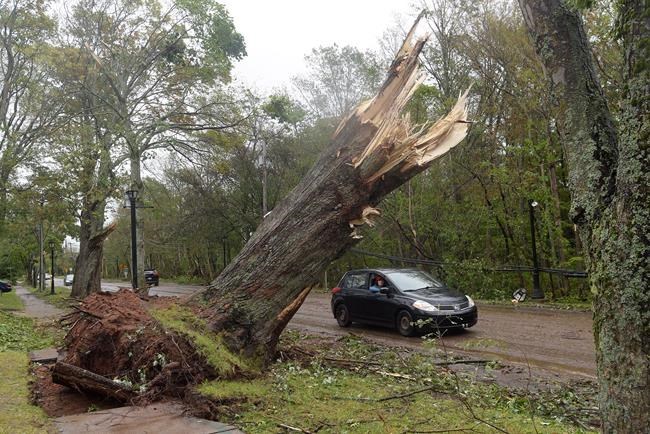CHARLOTTETOWN — Calls are growing for a public inquiry into how well Prince Edward Island's government and electrical utility were prepared for the ferocity of post-tropical storm Fiona, which left thousands without power for weeks.
The government should establish an inquiry with subpoena powers and independent commissioners to examine issues such as how 12 seniors residences, operated by the province, waited two weeks for power restoration, Peter Bevan-Baker, leader of the official Opposition Green Party, said Thursday.
Bevan-Baker said the inquiry should also investigate why there were long lineups for people to receive $250 assistance cheques, why 911 was disabled for several days, and why there was poor communication with the public during the disaster.
"I think the inquiry has to obviously deal with the response and the level of preparedness we had for this disaster, but it also would have to be forward looking and provide recommendations so we don't end up in the same pickle we're in at the moment," he said.
Premier Dennis King said this week he was "open" to having "someone" review how the province and the utility responded, but he didn't commit to what he referred to as a "full-blown inquiry." His office did not respond to a request for further comment on Thursday.
Pauline Howard, a volunteer with the P.E.I. Food Exchange — a group that assists Islanders in need of food — said in an interview Thursday that she favours the inquiry because of the need for accountability. She said an internal review isn't sufficient to probe how Maritime Electric and the government handled the disaster.
"I believe the situation has been mishandled," she said. "An inquiry could look at what went wrong and where does the accountability lie."
Don Desserud, a political science professor at the University of Prince Edward Island, said in an interview that an inquiry is a rare event on the Island, but one that may be attractive to the Progressive Conservatives as a way to absorb some of the public frustration.
He said there is public appetite to learn more about how to strengthen the province's electrical grid to face the next storm.
"From the government's standpoint, they don't like inquiries that get away from them, but it would give them an opportunity to take a step back and let things take their course .… In a way, it gets them off the hook," he said.
"Everything will depend how it's set up, who is on it, what the mandate would be."
Meanwhile, the Liberal, Green and Progressive Conservative members of the legislative committee on health have summoned representatives from Maritime Electric, the Island's Emergency Measures Organization, the Housing Department and the Canadian Red Cross to appear at a series of emergency meetings on the response to the post-tropical storm.
Bevan-Baker said full public inquiries can be costly, but he added that the risk of recurring climate emergencies means that lessons must be learned and acted upon before a storm similar to Fiona arrives again.
"Another third-party report such as we had after (post-tropical storm) Dorian in 2019 is not going to cut it this time," he said.
He also said there are questions to be explored on the breakdown in telecommunications after the storm, the lack of support for Islanders displaced from their homes and the failure to provide generators and other backup systems in some seniors facilities.
Bevan-Baker also said the utility, owned by Fortis Inc., lacks effective oversight.
"Without the powers that come with a public inquiry, these third-party entities wouldn't be compelled to come forward and held to account as I think they need to be," he said.
This report by The Canadian Press was first published Oct. 13, 2022.
— by Michael Tutton in Halifax.
The Canadian Press



